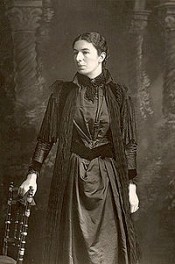Amiel Henri Frédéric

Mary Augusta Ward (née Arnold; 11 June 1851 – 26 March 1920), was a British novelist who wrote under her married name as Mrs Humphry Ward. Mary Augusta Arnold was born in Hobart, Tasmania, Australia, in 1851 into a prominent intellectual family of writers and educationalists. She was the daughter of Tom Arnold, a professor of literature, and Julia Sorrell. Her uncle was the poet Matthew Arnold and her grandfather Thomas Arnold, the famous headmaster of Rugby School. Her sister Julia married Leonard Huxley, the son of Thomas Huxley, and their sons were Julian and Aldous Huxley. The Arnolds and the Huxleys were an important influence on British intellectual life. Thomas Arnold was received into the Roman Catholic Church on 12 January 1856, which made him so unpopular in his job (and with his wife) that he resigned and returned to England with his family. Mary Arnold had her fifth birthday about a month before they left, and she had no further connection with Tasmania. Thomas Arnold at first could earn but a precarious livelihood, and his eldest child spent much of her time with her grandmother. She was educated at various boarding schools, and at 16 returned to live with her parents at Oxford, where her father had a history lectureship. On 6 April 1872, not yet 21, she married Humphry Ward, a fellow and tutor of Brasenose College, and also a writer and editor. For the next nine years she continued to live at Oxford. She had by now made herself familiar with French, German, Italian, Latin and Greek. She was developing an interest in social and educational service and making tentative efforts at literature. She added Spanish to her languages, and in 1877 undertook the writing of a large number of the lives of early Spanish ecclesiastics for the Dictionary of Christian Biography. Mary Augusta Ward began her career writing articles for magazines while working on a book for children that was published in 1881 under the title Milly and Olly. Her novels contained strong religious subject matter relevant to Victorian values she herself practised. Her popularity spread beyond Great Britain to the United States. According to the New York Times, her book Lady Rose's Daughter was the bestselling novel in the United States in 1903, as was The Marriage of William Ashe in 1905. Her most popular novel by far was the religious "novel with a purpose" Robert Elsmere, which portrayed the religious crisis of a young pastor and his family. Ward helped establish an organization for working and teaching among the poor and was one of the founders of the Women's National Anti-Suffrage League in 1908. In this latter vein, some of her writings were under the name "Mrs. Humphry Ward". She also worked as an educator in the residential settlements she founded. Mary Ward's declared aim was "equalisation" in society, and she established educational settlements first at Marchmont Hall and later at Tavistock Place in Bloomsbury. This was originally called the Passmore Edwards Settlement, after its benefactor John Passmore Edwards, but after Ward's death it became the Mary Ward Settlement. It is now known as the Mary Ward Centre and continues as an adult education college. In the summer of 1908 she was asked by George Nathaniel Curzon and William Cremer to become the first president of Britain’s Anti-Suffrage League. Ward agreed and took on the job creating and editing the Anti-Suffrage Review. She published a large number of articles on the subject, while two of her novels, The Testing of Diana Mallory and Delia Blanchflower, were used as platforms to criticize the suffragettes. In a 1909 article in The Times, Ward wrote that constitutional, legal, financial, military, and international problems were problems only men could solve. However, she came to promote the idea of women having a voice in local government and other rights that the men's anti-suffrage movement would not tolerate. During World War I, she was asked by United States President Theodore Roosevelt to write a series of articles to explain to Americans what was happening in Britain. Mary Augusta Ward died in London, England, and was interred at Aldbury in Hertfordshire, near her beloved country home Stocks.
do you like this author?
What readers are saying
What do you think? Write your own comment on this book!
write a commentWhat readers are saying
What do you think? Write your own comment on this author!
write a commentWhat readers are saying
What do you think? Write your own comment on this author!
write a commentif you like Amiel Henri Frédéric try:
readers also enjoyed
What readers are saying
What do you think? Write your own comment on this author!
write a commentif you like Amiel Henri Frédéric try:
readers also enjoyed
Do you want to exchange books? It’s EASY!
Get registered and find other users who want to give their favourite books to good hands!


